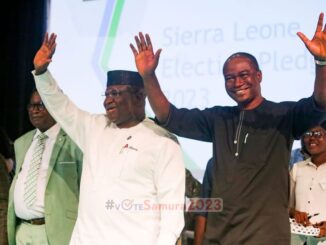
__________________________________
_________________________
_______________________________________
_________________________
_____________________________
URL:
Dear Mr. Kandeh,
Your post struck a strong cord in me. I don’t feel really qualified to comment on Sierra Leone culture, being an American myself. However I lived in Sierra Leone for 3 years from 1969 to 1972, working there as a teacher in Kenema. Just a few years ago I returned to Sierra Leone to work on a beekeeping project. I could not help notice the difference that 50 years had made.
My long absence had made these changes extremely noticeable. To be sure, there was a great improvement in nutrition and general health, particularly of the children. But another thing I noticed was a general sense of depression, a sort of hopelessness undefinable to me and yet very obvious.
Additionally I noticed a change in moral values. I questioned people in the most discreet way I could about this; as an outsider I found it difficult, because the agencies that used to regulate morality were forbidden to talk about back when I first visited Sierra Leone. I found that on my return these agencies were not nearly as respected, and it seemed to me that the weakening of their strength had contributed greatly to the declining morality of the nation. It seemed as if the main cultural Force to regulate the behavior of people had been weakened and there was nothing to make up for that weakening.
As much as I do not agree with what they call FGM, there is no doubt in my mind that in the past it was something that women accepted so completely that, had someone come into the village and suggested they should not do that, that person might have been run out and ridiculed by the women themselves. I think in general that for outsiders to try and dictate the cultural and moral values of another group is not only outrageously arrogant but also destructive for the pride and ethical nature of the group being attacked. You cannot force your version of morality on people.
This issue of change and the idea of cultural superiority is really a tough matter to deal with. Concepts and ideas are involved that one culture looks upon as ridiculous or even evil, and another culture views as just reality. For example Christians make fun of traditional spirits as superstition, yet believe in their own spirits freely themselves. I think I could sum up that vast divide, and the present changes, with a short story about a walk I took in the forest the last time
I visited Sierra Leone with some friends. We visited a forest reserve; I have a particular love of the forest, and they courteously offered to go with me for safety. When we got deep into the forest, I asked them if a certain entity, Ndogbosui (sp?) still was around. One man looked at me and rather sadly said “no….Ndogbosui has left the forest”.
_______________________________________________
As you know, the status of journalism today requires interactive communications between the newsgivers and the readers. In today’s Journalism, communication is both interactive and participatory. In this Mass Communication revolution, news consumers are no longer mere passive readers ; news outlets facilitate user participation by giving them voice . They must express their opinions and feelings about what they read.
In this connection, COCORIOKO will now publish the comments you make under our articles. After reading our articles, give feedbacks, contributions and opinions. We will publish your views under the YOUR COMMENTS column at the base of the website.
We will give everybody an opportunity to express their opinions. All we demand is that you be civil and desist from posting spam or trash.
We wish you all the best .
KABS KANU, PUBLISHER.





Leave a Reply